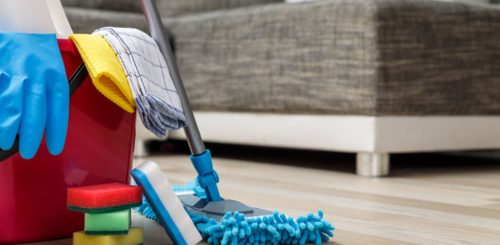The first step to any successful move is packing. This task in itself is quite demanding, but packing fragile items can be especially tedious. Luckily, there are tips and tricks on how to pack fragile items that can help you do this right.
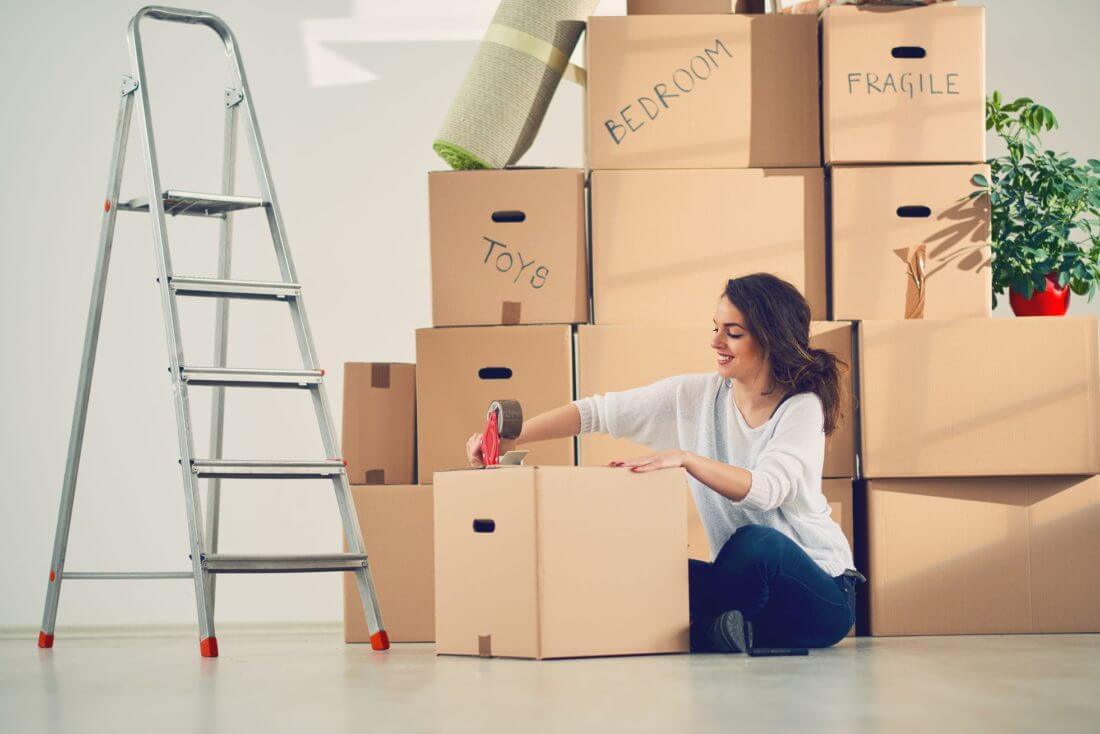

Having the Right Materials for Moving Fragile Items
Obtaining the best packing material for fragile items, such as boxes, bubble wrap, tape, or paper, should be the first thing on your to-do list. Write down on a piece of paper an inventory list of items you want to transport, a list of moving supplies you will need to pack those objects properly, and a new apartment shopping list of things you need to get before you move in. Here are some things we believe you might need.
How to Pack Fragile Items for Moving? Cardboard Boxes
Of course, boxes are a must for packing, regardless of what you’re putting in them. Don’t forget to get them in various shapes and sizes, as this will make transporting particular objects much easier. You might also need to find specialized boxes for things such as fine china, plates, glasses, or mirrors.


How to Package Fragile Items for Shipping? Use Bubble Wrap
Simply putting an item in a box is not enough to keep it protected. You will most likely need additional protective materials such as bubble wrap. Pack each item individually in bubble wrap before putting it into a box. If you can’t choose when to use which material, there are tips to help you decide between packing paper and bubble wrap, or any other supply.
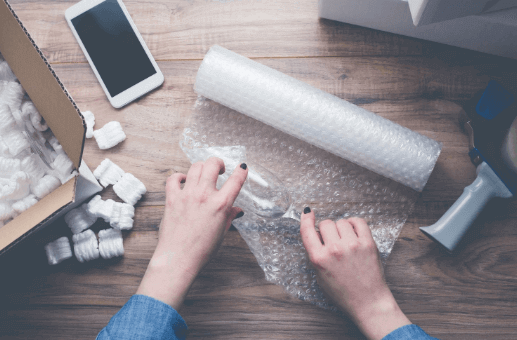

Use a Moving Dolly
If any of your delicate belongings are large and bulky, you will need a dolly to move them around. This item is especially handy for things such as grandfather clocks or larger art pieces.
Try Packing Peanuts for Moving Fragile Items
Peanuts are used to fill in all the empty areas in a moving box after you loaded it with your belongings. You could use newspapers or styrofoam as an alternative to peanuts.
Packing Fragile Items for Moving Is Impossible Without Duct Tape
This one should go without saying – having quality duct tape is crucial for protecting your things. Always check that everything is sealed properly before loading things into a shipping truck.
Pick Special Moving Boxes
Certain fragile objects cannot be placed inside a regular box. For example, wine glasses will require one divided into compartments that fit the glasses perfectly. Likewise, a large box should be reserved for lighter things, while smaller ones can hold heavier belongings.
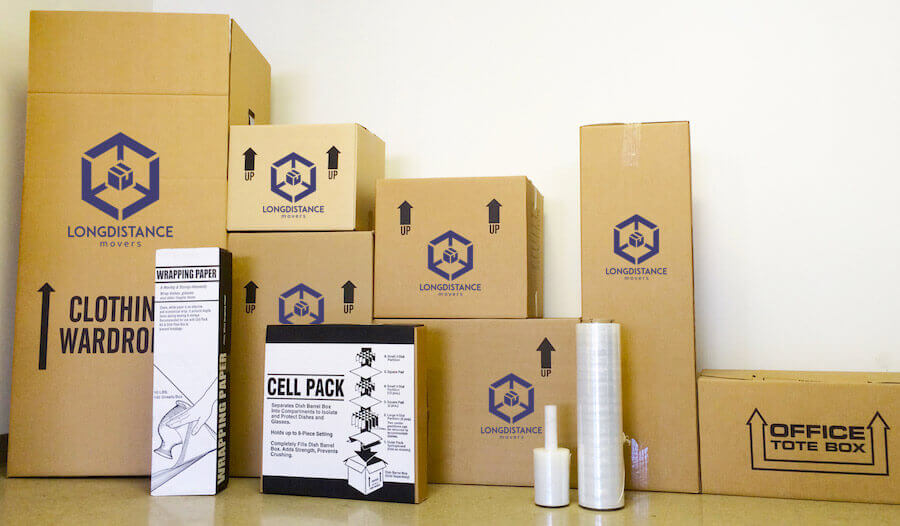

Wrap Your Fragile Items Before Shipping Them
Now that every package has its designated contents and vice versa, it is time to get down to business. Carefully pack each item in bubble wrap or paper before placing them inside. You can also use kitchen towels or old clothes for this purpose. The important thing is to make sure the objects are completely protected from all sides. After you’ve done this, fill in the rest of the empty space with peanuts and seal them. Gently shake each package to make sure the items inside aren’t flying around.
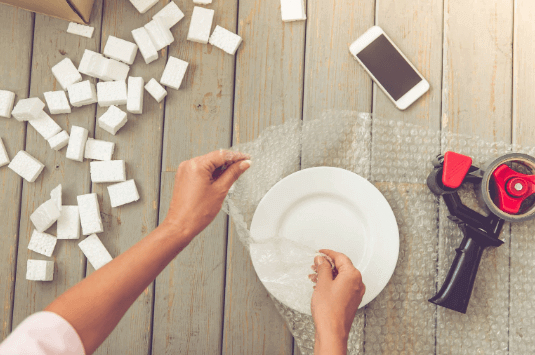

Label the Contents and Write Down Related Information
The next step is to label your things. Make sure you write “fragile” on all sides so our long-distance movers handle these objects with extra care. Write down the content of each package in detail, as well as any additional information you might find useful, such as the room the contents should go to. Another alternative to writing down the contents and rooms is color-coding. Simply designate a color for each room in your new home, and use stickers of that color to mark the packages that are supposed to go there. You can also use colored tape or markers.


Request a Packing Service From Your Moving Company
If all these instructions seem a little overwhelming to you, don’t worry. There is a way to make it all much simpler and easier. All you have to do is find a reliable relocation company, such as Long Distance USA Movers, and request professional packers along with your relocation service, and you’ll be able to save money while you relocate.
Professionals know how to package fragile items for shipping. They will also provide all the necessary supplies such as bubble wrap, paper, duct tape, and so on. With our services, you can also get relocation insurance, free and high-quality storage services for a month, and even car shipping whenever and wherever you want to go.
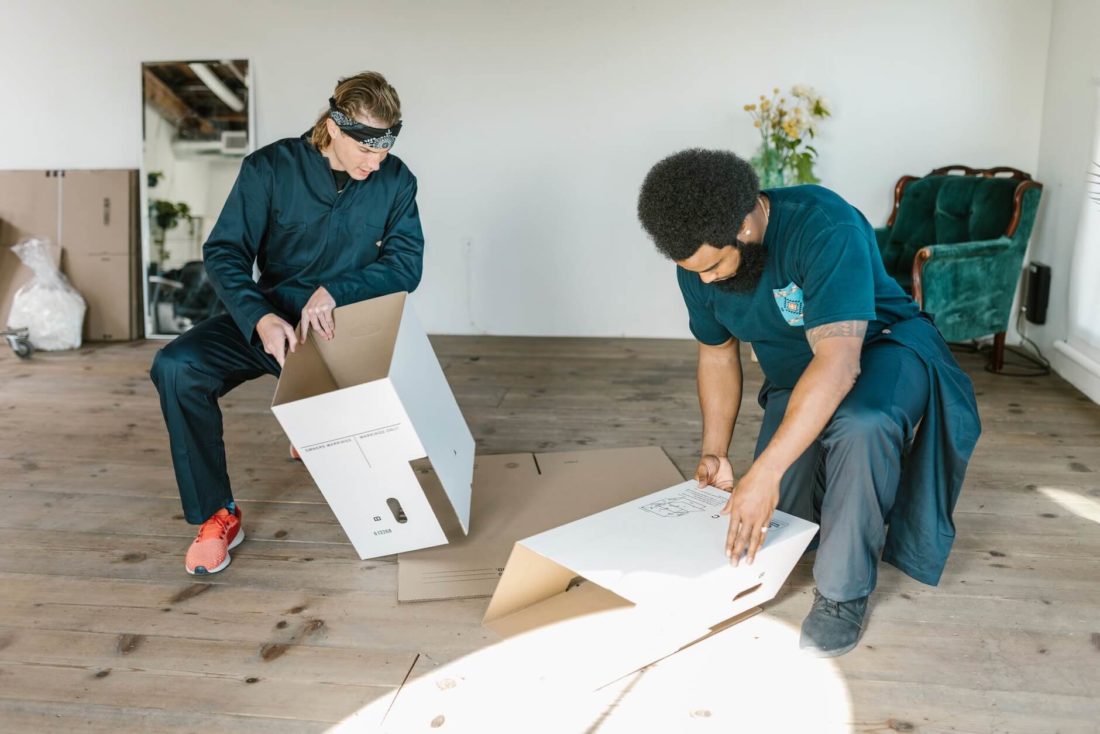

Are you still looking for the right relocation company to help you pack and move? Then you’ve come to the right place! We at Long Distance USA Movers are at your disposal. Feel free to give us a call and request a moving price estimate. The estimate is completely free and non-obliging. One of our customer service representatives will also happily answer any questions you might have. We are looking forward to helping you move.
Frequently Asked Questions About Packing Fragile Items
How Should I Pack Fragile Electronics for Moving?
When packing fragile electronics for moving, it’s important to take steps to ensure that they are protected during transit. If you still have the original packaging for your electronics, use it. This is designed to protect your items during shipping.
Wrap your electronics in bubble wrap to provide extra cushioning. Make sure to wrap each item tightly and cover all sides, including the screen and buttons. Place your wrapped electronics in a sturdy box. Use packing peanuts, air pillows, or crumpled paper to fill any empty spaces and prevent the item from shifting during transit.
Clearly label the box as “FRAGILE” to ensure that the movers handle it with care. Before packing, disconnect all cables and power cords, and unmount any electronics that are mounted to the wall.
What Is the Best Way to Pack Antiques and Other Valuable Fragile Items?
When packing antiques and other valuable fragile items, it’s important to take extra care to ensure that they are protected during transit. Here are some tips for packing antiques and other valuable fragile items:
- Research proper packing techniques: Before packing, research the proper techniques for packing your specific antiques or fragile items,
- Use proper materials: Use high-quality materials, such as bubble wrap, packing peanuts, and acid-free tissue paper to wrap and cushion your items,
- Individual wrapping: Wrap each item individually, making sure to cushion it fully on all sides, including the bottom and top,
- Strong boxes: Use strong boxes that are designed to protect fragile items, such as double-walled boxes or boxes with reinforced corners,
- Fill empty spaces: Fill any empty spaces in the box with packing materials to prevent the items from shifting during transit,
- Label the box: Clearly label the box as “FRAGILE” and “VALUABLE” to ensure that the movers handle it with care.
- Consider professional packing and moving services: If you’re not confident in your packing skills, consider hiring professional packers or long-distance movers who specialize in handling antiques and other valuable fragile items.
Can I Pack Fragile Items in Regular Boxes, or Do I Need Special Boxes?
Regular boxes weren’t designed to protect fragile items during transit and may not have the necessary strength and support to prevent them from breaking. Instead, it’s best to use boxes specifically designed for packaging fragile items, such as double-walled boxes or those with reinforced corners. These provide extra protection and stability to prevent the items from breaking during transit. Additionally, use proper materials, such as bubble wrap, packing peanuts, and acid-free tissue paper, to wrap and cushion the items inside the box.
How Should I Label Fragile Items for Moving?
When labeling fragile items for moving, it’s important to clearly and accurately convey the handling instructions to the movers and other people involved in the moving process.
Use bright, bold lettering to clearly label the items as “FRAGILE.” This will help long-distance movers and others handling the items be aware of the need for extra care. If there is a specific top or bottom to the item, label it as such. This can help prevent damage during transit.
If there are specific handling instructions for the item, write them on the label. For example, if the item needs to be kept upright, indicate this on the label. Label the item on multiple sides, so it can be easily seen from any direction. Use clear tape to securely attach the label to the item. Avoid masking tape or other types that can damage the item.
Can I Pack Fragile Items in My Checked Luggage for a Flight?
You can pack fragile items in your checked luggage, but take the necessary steps to protect them during transit. Here are some tips for packing fragile items in your checked luggage:
- Use high-quality materials, such as bubble wrap, packing peanuts, and acid-free tissue paper to wrap and cushion your items,
- Clearly label the luggage as “FRAGILE” to ensure that the airport handling crew and airline staff handle it with care,
- Pack the fragile items tightly in the luggage to prevent them from shifting during transit. Fill empty spaces with packing materials to prevent the items from bouncing around,
- Be mindful of the weight of your checked luggage, as heavy bags can cause damage to fragile items,
- Consider purchasing additional insurance for your fragile items to ensure that they are covered in the event of damage during transit.
Note that airlines are not responsible for damages to checked luggage, so it’s important to take the necessary precautions to protect your fragile items.
How Can I Ensure the Safety of Fragile Items During Storage?
To ensure the safety of fragile items in storage, clean and dry them thoroughly before storing them to prevent mold and other damage. Wrap them in materials like bubble wrap, packing peanuts, and acid-free tissue paper to cushion and protect them.
Clearly label the items as “FRAGILE” and indicate the top and bottom to ensure they are handled carefully. Store fragile items in a cool, dry place, away from direct sunlight, moisture, and extreme temperatures. Use sturdy containers, such as double-walled boxes or containers with reinforced corners, to store fragile items.
Avoid stacking boxes and containers on top of one another, as this can put pressure on the items inside. Consider using climate-controlled storage to protect your items from extreme temperatures and humidity.
